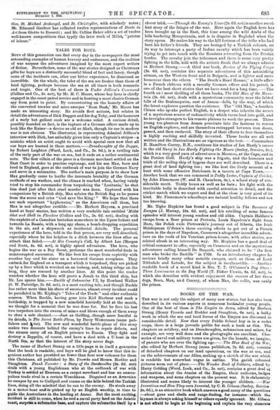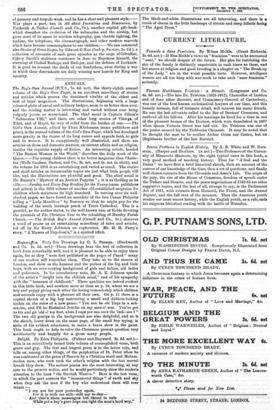BOOKS ON THE WAR.
Tax war is not only the subject of many new stories, but has also been described in its various aspects in numerous books.for young people. One of the best of these is The Empire in Arms, edited by Herbert Strang (Henry Frowdo and Hodder and Stoughton, 6s. net), a bulky work in which the sea and land forces of the Empire are discussed in considerable detail. Now that every Public School boy is in a cadet corps, there is a large juvenile public' for such a book as this. The chapters on artillery, and on Dreadnoughts, submarines and mines, for example, are very well done and the photographs are excellent. Glos- saries of naval and military terms are given, for the benefit, we imagine, of parents who are over the fighting age.—The Blue Book of the War, also edited by Herbert Strang (same publishers, 2s. 6d. net), consists of detached chapters on our land operations, on the war at sea, and on the achievements of our Allies, making up a sketch of tho war which is readable but somewhat vague in mains. The garish coloured pictures seem out of place.---The Wonder Book of Soldiers, edited by Harry Golding (Ward, Look, and Co., 3e. net), contains a great deal of information about the Armies of the Empire, their uniforms, badges and weapons, and some chapters on the present war. It is elaborately illustrated and seems likely to interest the younger children.-- --War Inventions and How They were Invented, by C. R. Gibson (Seeley, Service 3s. 6d.), is an attractive book which answers a good many of the questions —about guns and shells and range-finding, for instance—which the layman is always asking himself or others equally ignorant. Mr. Gibson is not afraid to begin at the beginning and explain the very elements of gunnery and torpedo-work. and he has a clear and pleasant style.— War plays a part, too, in All about Inventions and Discoverie2, by Frederick A. Talbot (Camel' and Co., Cs.), another capital gift-book, which describes the evolution of the submarine and the airship, but gives most of its space to wireless telegraphy, gas, electric lighting, the turbine, the telephone, the cinematograph, and other modern marvels which have become commonplaces to our children.—We can commend also Stcries of Greet Sieges, by Edward What (Seeby, Serv;ce, 2s. Cd ), a collection of accounts of such great episodes as the siege of Gibraltar, Sidney Smith's stubborn resistance in Acre to Napoleon himself, the storming of Ciudad Rodrigo and Badajoz, and the defence of Lucknow. It is good to recount the deeds of our forefathers, even during a war in which their descendants are daily winning new laurels for Xing and country.













































 Previous page
Previous page